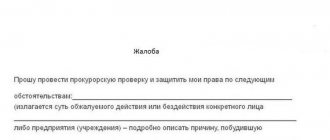The main task of the prosecutor's office is to protect the rights and freedoms of citizens. But in order for the body in question to provide maximum support, the main principle should be used - apply on time. This does not mean that you should go to the prosecutor's office on the first occasion. Reception of citizens and consideration of applications takes place according to a certain algorithm. The prosecutor is obliged to consider a case that falls under his jurisdiction. But you need to choose the most effective method of contact - in writing or a personal visit.
Who can file a complaint or application to the prosecutor's office?
All Russian citizens and foreigners living or staying on the territory of the Russian Federation have the opportunity to submit an application to law enforcement agencies. But, unfortunately, few people know about the time frame for considering complaints in the prosecutor's office. What happens after a direct appeal to law enforcement and how long should citizens wait for an answer?
Representatives of the prosecutor's office have obligations to control and supervise law and order and compliance with the rule of law. You can find out how long it will take to consider a submitted application in a particular case in the legislative acts of the relevant branch of procedural law and the Federal Law “On the procedure for considering appeals from citizens of the Russian Federation.” The waiting period for an official decision on an appeal may vary depending on the specifics of the case, clarification of the circumstances on this issue and other factors.
Complaints to the prosecutor's office
Powers of the prosecutor's office. The Prosecutor's Office of the Russian Federation is a unified federal centralized system of bodies that, on behalf of the Russian Federation, supervise compliance with the Constitution of the Russian Federation and the implementation of laws in force on the territory of the Russian Federation.
The organization and procedure for the activities of the Prosecutor's Office of the Russian Federation and the powers of prosecutors are determined by the Constitution of the Russian Federation, Federal Law No. 2202-1 “On the Prosecutor's Office of the Russian Federation,” and international treaties of the Russian Federation.
Ensuring the supremacy of law, unity and strengthening of the rule of law, protection of the rights and freedoms of man and citizen, as well as the interests of society and the state protected by law, the Prosecutor's Office of the Russian Federation carries out:
supervision over the implementation of laws by federal ministries, state committees, services and other federal executive bodies, representative (legislative) and executive bodies of the constituent entities of the Russian Federation, local government bodies, military command and control bodies, control bodies, their officials, management bodies and heads of commercial and non-profit organizations, as well as compliance with the laws of the legal acts issued by them;
supervision over the observance of human and civil rights and freedoms by federal ministries, state committees, services and other federal executive bodies, representative (legislative) and executive bodies of the constituent entities of the Russian Federation, local government bodies, military command and control bodies, their officials, as well as management bodies and heads of commercial and non-profit organizations;
supervision over the implementation of laws by bodies carrying out operational investigative activities, inquiry and preliminary investigation;
supervision over the implementation of laws by bailiffs;
supervision over the implementation of laws by the administrations of bodies and institutions executing punishment and applying compulsory measures prescribed by the court, administrations of places of detention and detention;
criminal prosecution in accordance with the powers established by the criminal procedural legislation of the Russian Federation;
coordinating the activities of law enforcement agencies to combat crime.
Contacting the prosecutor's office
The main reason for citizens to contact the prosecutor's office is the violation of their legal rights. This can occur both on the part of representatives of government bodies and public administration, as well as the administration of an enterprise, institution, or organization.
There is one fundamental difference between going to court and going to the prosecutor's office. If a citizen goes to court to protect his own rights (not counting the representation of the interests of minors, etc.), then he can turn to the prosecutor with a statement about the infringement of the rights of other persons, the interests of the state, as well as about a crime committed, regardless of whether against whom it was directed. As reported in the press, in connection with citizens' appeals, on the instructions of the Prosecutor General's Office of the Russian Federation, in a number of regions of the country, local prosecutors carried out checks of compliance by police authorities with the legislation on the search for missing elderly and disabled people. Numerous cases have been identified in which missing people turned out to be victims of the illegal actions of criminal groups who “figured out” lonely apartment owners and then killed them, or at best, turned them out the door. For all such facts, it was the prosecutor's office that initiated criminal cases, brought criminals to justice, and took all possible measures to restore violations of the law.
The reasons for appealing to the prosecutor can be very diverse. This is, for example, untimely payment of wages, all sorts of restrictions not based on laws. The absolute basis for contacting the prosecutor is the refusal of the police to register a citizen’s statement about illegal actions committed against him. Avoidance of their investigation is a gross violation of the law.
In turn, the prosecutor is obliged by law to consider the received appeal, check its validity and, when establishing facts of violation of the law, take measures to eliminate them and restore violated rights.
The law does not contain any restrictions in terms of contacting the prosecutor. The only condition for such a step is the fact that the law has been violated.
And again let us pay attention to the difference between going to court and going to the prosecutor.
The court, when dealing with a citizen’s claim, makes a decision on the merits. If he comes to the conclusion that the plaintiff’s demands are justified, then at the same time he recognizes the defendant’s actions as illegal (cancels the order, evicts from an illegally occupied apartment, collects moral damages, etc.), imposing on the guilty party the obligation to restore violated rights. If the court considers that the claim is unlawful, it refuses the plaintiff.
As for the prosecutor, he cannot cancel the appealed or contested act and has the right only to respond to the violation by filing a protest or presentation. Managers and officials, having received such a document from the prosecutor, are obliged to review it within the time limits established by law and make a decision to eliminate the violation.
The prosecutor is obliged by law to seek elimination of violations of the law and has the right, in order to protect the violated rights of the applicant, to file a lawsuit for their protection.
Requirements for a complaint (application)
Complaints, statements and appeals can be filed by the citizen himself, whose rights have been violated, or his representative, as well as, at the request of the citizen, by an authorized representative of a public organization or work collective.
There is no strictly established form of appeal to the prosecutor (unlike a statement of claim to the court, the content and format of which is clearly regulated by the Code of Civil Procedure of the Russian Federation). An application or complaint is drawn up in any form with a description of the essence of the violation committed (and references to specific provisions of the law are not required - the prosecutor’s office will sort this out themselves), indicating information about the violator or the organization where the violation was committed.
The complainant must provide information about himself - last name, address, telephone number, so that the prosecutor can contact the citizen and inform him about the results of the consideration of the appeal.
A complaint (statement), as a rule, is written to the prosecutor of the district in which the enterprise, institution, organization is located or the person who violated the law lives. It can be sent to the prosecutor by mail, and also handed to him at a personal reception, transferred directly to the prosecutor's office and must be registered.
An appeal is a proposal, statement, complaint or petition (including collective) expressed in written or oral form by a citizen, official or other person.
A proposal is the applicant’s recommendation for improving laws and other regulations, the activities of state bodies and local governments, developing public relations, improving the activities of the state and society in the socio-economic and other spheres.
Application - a citizen’s request for assistance in the implementation of his constitutional rights and freedoms or the constitutional rights and freedoms of other persons, or a message about violations of laws and other regulatory legal acts, shortcomings in the work of state bodies, local governments and officials, or criticism of the activities of these bodies and officials.
A complaint is a request by the applicant for restoration or protection of his violated rights, freedoms or legitimate interests or the rights, freedoms or legitimate interests of other persons.
A petition is a citizen’s written request for recognition, in cases established by the legislation of the Russian Federation, of a certain status, rights, and freedoms.
A collective appeal is an appeal from two or more citizens, as well as an appeal adopted at a rally or meeting and signed by the organizers or participants of the rally or meeting.
A duplicate appeal is an appeal from a citizen, which is a copy of a previous appeal, or a copy of an appeal on the same issue and in the interests of the same person.
Repeated appeal - an appeal received from the same person on the same issue.
Parliamentary request - a request adopted by the relevant chamber of the Federal Assembly of the Russian Federation in compliance with the requirements of Art. 18 of the Federal Law of 05/08/1994 N 3-FZ “On the status of a member of the Federation Council and the status of a deputy of the State Duma of the Federal Assembly of the Russian Federation” in the manner established by their regulations, on issues within the competence of the Prosecutor General of the Russian Federation.
A request from a member of the Federation Council, a deputy of the State Duma of the Federal Assembly of the Russian Federation is a properly executed document about violations of laws with a requirement to eliminate them and sent to the Prosecutor General of the Russian Federation.
Appeal from a member of the Federation Council, deputy of the State Duma of the Federal Assembly of the Russian Federation - a document of a member of the Federation Council, deputy of the State Duma of the Federal Assembly of the Russian Federation, sent to the prosecutor's office with a report of violations of the law, as well as with a request to provide information, information and documents on issues related to their activities, and not formalized as a request.
Statements and reports about a crime committed or being prepared are considered in the manner prescribed by criminal procedure legislation (Article 141 of the Code of Criminal Procedure of the Russian Federation).
Complaints against actions (inaction) and decisions of inquiry bodies, interrogators, investigators and prosecutors related to the investigation of criminal cases, as well as against sentences, decisions, rulings and rulings of courts are verified in the manner and within the powers provided for, respectively, by criminal procedure, civil or arbitration procedural legislation.
Citizens' appeals sent by the media are also considered.
Contents of the appeal
A written appeal from a citizen, as well as an official and other person, must contain the last name, first name, patronymic, address, name of the body or official to whom it was sent, a statement of the essence of the issue, an indication of the law violated, in the opinion of the applicant, the date and personal signature.
Appeals that do not contain information about the person (last name and location (address)) are considered anonymous and left without permission. If such requests contain messages about crimes being prepared or committed, they are sent to law enforcement agencies according to their affiliation.
Appeals with indistinguishable text or those in which there is no information sufficient to resolve them (about the body that made the appealed decision, about the time of its adoption, etc.) are returned to the applicants within five days with an offer to fill in the missing data, as well as with an explanation where they should go for this. Copies of such appeals are placed in supervisory proceedings.
Requests and other appeals, the content of which indicates direct interference of the authors in the activities of the prosecutor's office during the investigation of criminal cases or the exercise of supervisory powers, are not subject to permission.
A motivated message about this is sent to the author of the appeal within ten days. To find out more about the legal services provided, terms, costs, or order the legal service you need, you can call the numbers listed above
What must be included in a written request?
A complaint to the prosecutor's office must be submitted in writing or sent by email. Before a citizen’s application reaches the competent official, its essence and form are first studied by employees of the prosecutor’s office.
In a written appeal, it is necessary to state its essence, endorse it with a personal signature and date, and also indicate:
- full name of the territorial prosecutor's office;
- information about the applicant;
- postal or email address to which the response should be sent;
- contact number.
To confirm his own arguments, the applicant should attach documentary sources, additional information or copies thereof to the written appeal. A response to a complaint or application, including one received electronically, is sent by postal or email within the time frame established for consideration of the complaint by the Prosecutor's Office of the Russian Federation.
Where can I find a sample complaint to the Prosecutor General's Office?
On our website you can download a current sample complaint to the Prosecutor General’s Office and use it as the basis for your own appeal:
Complaint to the Prosecutor General's Office of the Russian Federation (2022 version)
Note! If you need help drafting a complaint, you can always contact our lawyers for a free consultation. The average waiting time for a response is 15 minutes.
What determines the processing time for applications?
If the established requirements are met, the complaint or application is transferred for consideration to the prosecutor's office. The time frame for a decision to be made largely depends on the following conditions:
- the need for a subordinate study of the case by lower law enforcement agencies;
- full or partial satisfaction of the interests of the appealing citizen, restoration of his violated rights;
- the need to carry out explanatory work on the requirements specified in the complaint.
In addition, the appeal may be rejected if, as a result of an inspection by law enforcement officers, it turns out that the requirements specified in it turned out to be unfounded. If you refute the facts of any violation, please contact:
- returned to the applicant;
- attached to previous materials received from the same person and sent to the archive;
- left without consideration or permission;
- sent to subordinate structures.
On what issues are citizens received and their cases considered?
Contacting the prosecutor's office in cases that really require such measures is a natural action. People seek help if they have suffered due to the actions of others or when their rights are violated. The list of issues that are considered by the prosecutor's office is quite wide. But let's discuss the most difficult ones:
- If laws or other regulations are not followed at the local government level. The prosecutor's office can challenge the actions of both entire departments and specific officials.
- In cases where the laws are not followed by bailiffs.
- When the offense is committed by an individual (ordinary citizen).
The prosecutor's office will help determine the essence of the problem and conduct a legal assessment of it. After the application, employees will check the submitted material, received documents and various evidence base. Qualified experts will be involved in the work if necessary.
General and shortened deadlines for familiarization with the details of the case
The time frame for considering complaints in the prosecutor's office is divided into two main categories: general and shortened. The “standard” waiting period for citizens is 30 calendar days. As a rule, most of these requests do not require an urgent response, and therefore law enforcement officers have enough time to make the necessary requests and receive answers to them, check the accuracy of the facts specified in the request, and find out additional information that will contribute to the successful resolution of the issue.
In some cases, the period for consideration of requests (applications, complaints) by the prosecutor's office is reduced to 15 days. On what grounds can you get an answer faster is stated in the Federal Law “On the procedure for considering appeals from citizens of the Russian Federation” dated May 2, 2006:
- if the received application does not require additional verification;
- if representatives of the corps of human rights commissioners make an application or complaint;
- if you need to give a response to a parliamentary or deputy request.
Response to a complaint
After all materials submitted along with the complaint have been reviewed and all necessary checks have been carried out, the results are summed up and a response is sent to the applicant. The results of the check may be as follows:
- The complaint will be upheld. In this case, the applicant’s requirements will be fulfilled within the time period specified in the application;
- Refusal to satisfy demands. The demands made are illegal or the application is drawn up incorrectly;
- Explanation of what happened. If the applicant did not put forward demands, then the actions of the government agency will be reviewed and the fact of violation of the law will be verified, and the applicant will be given an explanation;
- Transfer of documents to the authorized body. If the scope of activity of the prosecutor’s office does not include consideration of violations and fulfillment of the applicant’s requirements, then all documents are transferred to the competent authority, and the applicant is sent a notice of the transfer of documents to another organization.
Particular attention should be paid to the grounds for refusal to consider the requirements presented to the Prosecutor General's Office of the Russian Federation. Refusal to satisfy claims may be obtained on the basis of the following:
- Filing an anonymous complaint;
- Lack of contact information required to send a response;
- Illegible handwriting;
- Use of insults against organizations and government officials, as well as failure to comply with the rules for writing business documents;
- The citizen's appeal has no meaning;
- The applicant's demands are illegal.
Receiving a refusal is always justified from a legal point of view. The fact that consideration of the document was refused does not mean that you will not be able to defend your rights. It is enough to simply make the necessary changes to the application. If you do not understand on what basis the document was refused, then it is advisable to seek advice from a qualified lawyer who will explain the reasons for the refusal and help make all the necessary changes to the document.
Prompt consideration of a citizen’s appeal
Appeals are immediately accepted for consideration, decisions on which are made within three days. At the request of the prosecutor, the specified deadlines for consideration by the prosecutor's office of complaints and applications may be extended, but not more than for a 10-day period. Most often, complaints arising in criminal proceedings fall into this category. If the deadline for consideration of a complaint by the prosecutor's office falls on a holiday or public day off, then the date for making a decision on it will be the next working day.
A separate category of appeals includes statements and complaints taken under the special control of law enforcement officers and the Prosecutor General's Office in particular. The Federal Law “On the procedure for considering citizens’ appeals” does not apply in this case; the deadlines are regulated on an individual basis.
Can the applicant review the inspection materials when the complaint is considered?
At the request of the applicant, he may be given the opportunity to familiarize himself with documents that affect his freedoms and rights.
What is the processing time for applications? Complaints, statements and proposals from citizens must be resolved within 15 days from the moment they are received by the prosecutor's office, but if additional verification is necessary, the period is increased to 30 days, but no later, in accordance with clause 5.1 of the instructions. But there is also a clause providing for cases when federal law establishes a different deadline. According to the Code of Criminal Procedure of the Russian Federation, the maximum period for consideration of complaints is 10 days. The main documents regulating the time frame for consideration of a complaint by the prosecutor's office have been reviewed.
Recommendations: what is the best way to file a complaint with the prosecutor's office?
The request is considered accepted from the moment the incoming request is registered in the appropriate accounting journal. The procedure for considering complaints by the prosecutor's office does not specify the option for filing a document. However, in practice, the best and proven way is to make an appointment with a competent official. In this case, the application will be registered on the same day.
When sending a complaint by mail, the time frame may be significantly delayed. In addition, when submitting an application to the prosecutor's office, it is worth considering several important recommendations:
- Law enforcement officers are required to notify the citizen who has applied and any delays that arise during the review process and their reasons.
- The appeal can be made either in writing (by hand) or typed on a computer. The main thing is that the text is readable and free of grammatical and lexical errors.
- The prosecutor's office will not consider applications sent anonymously or repeatedly, as well as those that have been subject to repeated inspections.
- To clarify the result of consideration of the appeal or the need for an oral explanation of its essence, the applicant has the right to make an appointment with a competent person.
How to make a request?
In accordance with Art.
27 of the Federal Law “On the Prosecutor’s Office of the Russian Federation”, employees of the Prosecutor General’s Office are obliged to consider and verify all complaints, messages and statements received by them. You must complete your application carefully so as not to miss important points. There is no legally established form of the document. Therefore, you can make your own adjustments. Download a sample complaint to the Prosecutor General's Office
Before writing a complaint, you need to familiarize yourself with the principles of its preparation.
- In the header of the document it is necessary to indicate the addressee’s details: name of the authority, legal address. Personal information about the applicant is also reflected: last name, first name, patronymic, residential address, contacts. Anonymous requests will not be considered by representatives of the Prosecutor General's Office.
- The text should be written in a business style. The use of obscene language and emotional words is not allowed.
- The main text of the document should describe the current situation. It is necessary to specify what claims there are against a specific official or authorities.
- It is necessary to indicate the requirements to take measures based on the legislation of the Russian Federation. But one cannot prescribe a desire to impose disciplinary sanctions and other types of responsibility on violators.
- The complaint must be accompanied by documents confirming what was written: decisions, official written refusals to consider the initial complaint, results of inspections.
- The text of the complaint contains a list of documents that will be attached.
- At the bottom of the application is the date and signature of the originator.
Despite the fact that the complaint is free-form, it must be drafted correctly. Otherwise, consideration may be refused.
Why are the deadlines for considering the case in the prosecutor's office violated?
As a rule, the duration of the decision-making process does not exceed the established period for consideration of the complaint by the prosecutor's office. Whatever the result, the applicant must receive a response. If the review period is delayed, or the results of the verification of the applicant are not reported, it is likely that the document was not accepted. In most cases, incorrectly completed applications are returned to applicants within a week. The prosecutor's office may refuse to consider the complaint due to the need for clarification, in which case law enforcement officers send the citizen a response with a request to supplement the appeal with facts, details of the information presented, etc.
Within seven days, the applicant will receive a response letter from the prosecutor’s office if:
- his appeal was considered direct interference in the work of supervisory structures;
- the complaint or statement contains a threat to the lives of employees or third parties;
- The text contains obscene language and swearing and offensive words.
Results of consideration
Upon review, several decisions may be made.
- The complaint may be upheld. The claim is taken into account. After this, measures must be taken to resolve the conflict.
- The application may be rejected. This is provided if the complaint is found to be unfounded.
- The Prosecutor General's Office can provide clarifications regarding the complaint. A solution is possible if the application does not contain requirements. The citizen will be given legal explanations.
- The request may be redirected. A 5-day period is allotted for this. The complaint is transferred to another organization.
If the document was rejected, you need to check whether any errors were made.
What complaints will the prosecutor's office not consider?
The response from law enforcement officers will be supplemented by a warning about the impossibility and inadmissibility of such an appeal to government supervisory authorities in the future. In some cases, an unscrupulous recipient may face administrative liability. The time frame for consideration of citizens' complaints by the prosecutor's office is not taken into account if the content of the appeal is illogical and meaningless. If the applicant does not agree with the decision made regarding his appeal, law enforcement officers will indicate to him the possibility of appealing the relevant decision to a higher authority or court.
If the citizen’s submitted application does not fall within the competence of the supervisory authority, such an appeal is redirected for consideration to the appropriate structure. The prosecutor's office must notify the applicant about this within a week.
What actions to take if the prosecutor’s office is not considering the appeal
There are situations when there is silence in response to an appeal presented to employees of the prosecutor's office. If consideration of this document is not possible, a refusal must be received. If there is no reaction at all, you need to send a complaint about the inaction of the prosecutor’s office to higher authorities.
There are several significant circumstances that may cause a complaint to be filed:
- employees at the reception regarding the consideration of the case were engaged in extortion;
- there was no response letter to the application;
- employees did not take the measures required by law regarding the complaint;
- Employees of the prosecutor's office were found to have abused their official position.
If any of these offenses are recorded, a complaint is filed against the culprit to the district prosecutor's office. You can also use the website of the Prosecutor General's Office by filing a complaint online. This way the application will definitely be in order and will not get lost along the way. Some requests are forwarded to the police if the case requires it.
Law enforcement agencies consider all cases related to offenses, but in order for the case to be considered, you must attend an appointment or send an application to the local prosecutor's office. The order of consideration of each case must be strictly observed. If it is violated, a Russian citizen can report this to the district prosecutor's office in order to punish the violator and prevent negligence in work. In other cases, the reception at the prosecutor's office effectively copes with troubles.
Features of submitting an appeal to state supervision authorities
When a citizen first applies, the application is sent to a lower law enforcement agency if a check on this issue has not been previously carried out. If the text contains information about the commission of a criminal offense, the appeal is sent to the police department to begin criminal proceedings. Before writing a complaint to the prosecutor's office, you should first clarify whether the proceedings on this issue will fall within the competence of the prosecutor, and therefore a rational decision would be to obtain preliminary advice from a lawyer. A specialist knowledgeable in the relevant legal field will not only give valuable advice on further actions, but will also guide the applicant in the time frame for consideration of complaints and applications by the prosecutor’s office.
As already noted, the prosecutor’s office does not leave citizens’ appeals unanswered. The exception is anonymous and other incorrectly compiled documents. After a comprehensive review of the case, the applicant is sent a response - a decision on the case, endorsed by the prosecutor. The consideration of the complaint is considered completed only if law enforcement officers have eliminated all the violations that were indicated in the appeal or issued instructions for their elimination.
Reasons for appeal
There are quite a large number of reasons on which a citizen can turn to the Prosecutor General. In most cases, complaints are related to the fact that the rights and freedoms of a citizen were violated without apparent grounds, and the statement indicates the persons who committed the violation.
A sample complaint to the Prosecutor General's Office can be found on the official website. If a citizen does not have a legal education and does not have experience in writing complaints to government agencies, then he should contact a qualified lawyer who has experience in drawing up various complaints. In this case, the likelihood of meeting the requirements will be much higher. A good lawyer will help you correctly describe the current situation, explain what citizen’s rights were violated, confirming this with references to current legislation, and help set out the requirements. It is also worth remembering that according to the Constitution of the Russian Federation, not only the injured party, but also a person who has witnessed the violation of the rights of other citizens can complain.
Now let's look at the main functions that this organization performs:
- Monitoring compliance with current legislation;
- The fight against corrupt government officials;
- Upholding state interests aimed at defending the country;
- Protection of citizens engaged in business activities, as well as protection of the interests of legal entities;
- Control over the work of law enforcement agencies;
- Ensuring the country's security;
- Consideration of complaints related to challenging incorrect court decisions;
- Countering terrorism and extremism.
How and when can I get acquainted with the prosecutor's decision?
When making a prosecutor's presentation, the applicant is explained where and within what time frame he can become familiar with the results of the execution of the prosecutor's decision. When applying collectively, a response letter is sent either to everyone whose signatures are present on the application, or to the one whose last name is listed first. This citizen is responsible for notifying the other participants in the appeal about the results of the inspection.
The period for consideration of complaints by the prosecutor's office ranges from 3 to 30 days, but in the event of a request from the prosecutor, it can be extended for a period of 10 to 30 days. But you should also pay attention to other time restrictions. For example, the time limit for appealing decisions made by officials or the court in the field of criminal proceedings, as a rule, does not exceed ten days. If the applicant filed a complaint with an inappropriate institution, then the receiving authority has the obligation to forward the appeal as intended, notifying the citizen about this within seven days and giving him the necessary explanations about taking subsequent legally competent steps.
On the procedure for considering and resolving appeals and receiving citizens
The current legislation provides for the right of citizens to appeal decisions and actions of officials and courts that carry out criminal proceedings.
If a citizen filed a complaint with the wrong institution, for example, the prosecutor’s office instead of the internal affairs department, then it must send the complaint to the proper place within 7 days, at the same time notifying the applicant about it in accordance with clause 3.3 of the instructions and explaining where he needs to apply. The notice must be signed by the appropriate official.
What is the period for consideration of a complaint by the prosecutor's office? If you apply to the wrong address, within 7 days from the receipt of the complaint it must be sent to the appropriate authority and the complainant must be notified about it. Notification is made in writing by post.
The timing of consideration of citizens' complaints by the prosecutor's office must be taken into account without fail.
Completion of the complaint and official correspondence
In accordance with federal law, neither a complaint nor an application received by state supervisory authorities and drawn up in the proper form can be ignored. However, to terminate correspondence between the applicant and the prosecutor’s office, the following conditions must be met:
- All arguments and the completeness of the questions raised are checked.
- The applicant, within 7 days, must receive a reasoned conclusion from the prosecutor that further correspondence is inappropriate.
- Upon completion of the correspondence, the receipt of new requests that do not have additional arguments behind them do not serve as reasons for its resumption.
Main areas of activity of the Prosecutor General's Office in 2022
Today, the range of issues dealt with by the Prosecutor General's Office of the Russian Federation is quite wide. If we highlight the list of the main problems and priority areas of work of this department, it will look like this:
- Implementation of state supervision over compliance with the laws of the Russian Federation;
- Fight against corruption;
- Protection of state interests in the defense sector;
- Protecting business freedom;
- Coordination of anti-crime activities;
- Ensuring economic security;
- Challenging illegal and unfounded judicial acts;
- Countering terrorism and extremism.








